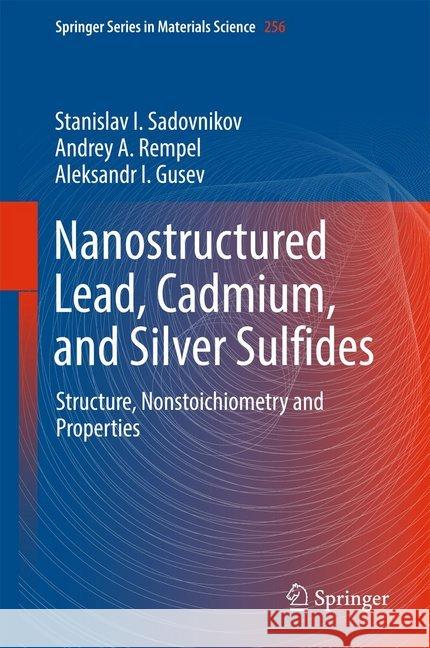Nanostructured Lead, Cadmium, and Silver Sulfides: Structure, Nonstoichiometry and Properties » książka



Nanostructured Lead, Cadmium, and Silver Sulfides: Structure, Nonstoichiometry and Properties
ISBN-13: 9783319563862 / Angielski / Twarda / 2017 / 317 str.
Nanostructured Lead, Cadmium, and Silver Sulfides: Structure, Nonstoichiometry and Properties
ISBN-13: 9783319563862 / Angielski / Twarda / 2017 / 317 str.
(netto: 191,66 VAT: 5%)
Najniższa cena z 30 dni: 192,74
ok. 22 dni roboczych.
Darmowa dostawa!
This book presents and analyzes the influence of small size particles of lead, cadmium and silver sulfide on the properties of nonstoichiometric semiconductors. The effect of nanoparticle size and nonstoichiometry on the band gap, optical and thermal properties of nanostructured sulfides is also considered.
LIST OF MAIN NOTATIONS
PREFACE
References
1 SIZE CHARACTERIZATION OF NANOSTRUCTURED
MATERIALS
1.1 Concept of Nanostructured Material
1.2 Methods of Evaluation of the Size of Small Particles
1.2.1 Electron Microscopy
1.2.2 X-Ray Diffraction Method
1.2.3 Sedimentation, Photon Correlation Spectroscopy,
Gas Adsoption, and Gas Filtration
References
2 NANOSTRUCTURED LEAD SULFIDE PbS
2.1 Methods for the Preparation of Nanostructured Lead Sulfide:
From Colloidal Solutions to Thin Films
2.1.1 Colloidal Solutions of Lead Sulfide Nanoparticles
2.1.2 Analysis of the Formation Conditions of Lead Sulfide in
Aqueous Solutions
2.1.3 Deposition of Lead Sulfide Nanopowders
2.1.4 Deposition of Lead Sulfide Particles with Different Morphology
2.1.5 Lead Sulfide Quantum Dots
2.1.6 Nanostructured Lead Sulfide Films
2.2 Crystal Structures of Nanoparticles, Nanopowders, and Nanofilms of
Lead Sulfide
2.2.1 Crystal Structure of Nanopowders and Quantum Dots2.2.2 Crystal Structures of Nanofilms
2.2.3 Correlations of Sulfur Atoms S in PbS Nanostructured Films
2.3 Properties of Nanostructured Lead Sulfide
2.3.1 Optical Properties and Band Gap2.3.2 Thermal Properties
2.3.3 Stability of Nanostructured Lead Sulfide
2.4 Application of Nanostructured Lead SulfideReferences
<3 NANOSTRUCTURED CADMIUM SULFIDE CdS3.1 Chemical Deposition of Nanostructured Cadmium Sulfide CdS
3.1.1 Formation of Aqueous Colloidal Solutions of CdS
3.1.2 Formation of CdS Nanoparticles
3.1.3 Deposition of CdS Film on Substrates
3.2 Synthesis of CdS Nanoparticles in Glass Matrix
3.3 Features of Crystal Structure of CdS Nanoparticles
3.3.1 Non-periodicity in Sulfide Nanoparticles with Close-pace
Structures
3.3.2 Visualization of “Average” Long-range Order in the
Non-periodic Structure of CdS Nanoparticle
3.4 Optical Properties of Nanostructured CdS
References
4 NANOSTRUCTURED SILVER SULFIDE Ag2S
4.1 Methods of Synthesis of Nanostructured Silver Sulfide Ag2S
4.1.1 Synthesis by Decomposition of Molecular Precursors
4.1.2 Synthesis of Nanostructures Silver Sulfide with Different
Morphology
4.1.3 Biotechnological and Other Methods for Preparing
Nanostructured Ag2S Silver Sulfide
4.2 Crystal Structure of Coarse-Crystalline and Nanostructured
Ag2S Silver Sulfide
4.2.1 Crystal Structure of Artificial Coarse-Crystalline a-Ag2S
Silver Sulfide
4.2.2 Crystal Structure and Nonstoichiometry of Nanostructured
a-Ag2S Silver Sulfide
4.2.3 In Situ High-Temperature Study of “Acanthite a-Ag2S –
Argentite
4.2.4 Thermal Expansion of Acanthite a-Ag2S and Argentite b-Ag2S
4.3 Universal Approach to Synthesis of Silver Sulfide in the Form
of Nanopowders, Quantum Dots, Core-Shell Nanoparticles,
and Heteronanostructures
4.3.1 Green Synthesis of Nanostructured Ag2S Without Hazardous
Substances
4.3.2 Coarse-crystalline Ag2S powders
4.3.3 Deposited Ag2S Nanopowders
4.3.4 Colloidal Solutions of Ag2S Quantum Dots
4.3.5 Core-Shell Ag2S@C Nanoparticles
4.3.6 Ag2S/Ag heteronanostructures
4.4 Hydrochemical Bath Deposition: Advantages and Challenges
Appendix
References
NAME INDEX
SUBJECT INDEX
Dr. Stanislav I. Sadovnikov is currently a senior research scientist in the Laboratory of nonstoichiometric compounds of the Institute of Solid State Chemistry of the Ural Branch of the Russian Academy of Sciences. He has studied the synthesis, structure and properties of nanostructured semiconducting sulfides for more than 10 years and is a recognized expert in the field of nanosized sulfide synthesis. He is an author of two review articles and more than 60 scientific articles.
Prof. Dr. Aleksandr I. Gusev is chief research scientist of the Laboratory of nonstoichiometric compounds in the Institute of Solid State Chemistry of the Russian Academy of Sciences. He has been exploring crystal and electronic structure and properties of novel nonstoichiometric compounds including carbides, sulfides, and oxides, and nanostructured advanced materials for more than 40 years. He is the author of 16 monographs including “Disorder and Order in Strongly Nonstoichiometric Compounds”, Springer (2001), “Nanocrystalline Materials”, Cambridge (2004), “Tungsten Carbides: Structure, Properties and Application in Hardmetals”, Springer (2013), 23 reviews articles and more than 250 scientific articles.
Prof. Dr. Andrey A. Rempel is a head of the Laboratory of nonstoichiometric compounds of the Institute of Solid State Chemistry of the Ural Branch of the Russian Academy of Sciences. His current research interests are solid state physics, theory of phase transformations, atomic ordering in strongly nonstoichiometric compounds, nonstoichiometry and atomic defects in nanocrystalline substances including carbides, oxides, and sulfides. He is author of 10 monographs in English and Russian, 11 review articles and more than 200 scientific publications.
This book presents and analyzes the influence of small size particles of lead, cadmium and silver sulfide on the properties of nonstoichiometric semiconductors. Important nonstoichiometry aspects in nanostructures are discussed, such as the distribution of sulfur atoms in nanofilms, a non-periodic distribution of the atomic planes in nanoparticles, interdependent changes in crystal structure of nanocrystalline material. Tuning the stoichiometry allows to obtain superionic conductivity and catalytic activity under visible light. The wavelength of the luminescence of nanoparticles changes with the size of the nanoparticles. Various methods to prepare nanostructured sulfides are described. Special attention is given to the hydrochemical bath deposition as a universal method for the synthesis of sulfides as nanofilms, stable colloidal solutions, quantum dots, isolated nanoparticles with a protective shell and heteronanostructures. The effect of nanoparticle size and nonstoichiometry on the band gap, optical and thermal properties of nanostructured sulfides is also considered. The novel applications of sulfide nanoparticles in nanoelectronics, catalysis, nanobiology and nanomedicine are sketched.
1997-2026 DolnySlask.com Agencja Internetowa
KrainaKsiazek.PL - Księgarnia Internetowa









